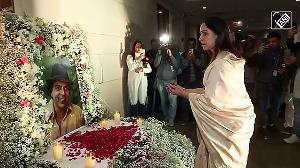Obviously reflecting the chagrin of US business over the Government of India's buckling to the mounting pressure and outcry to suspend its earlier decision to open up the multi-brand retail sector to foreign direct investment, Ron Somers, the president of the US-India Business Council took some hefty tongue-in-cheek swipes at New Delhi's reversal, noting that it was yet another manifestation of the series of disappointments American business and industry has had to endure over the past year. Somers, speaking the annual fund-raising gala of the American India Foundation in Washington, DC, noted that the government of India's decision put paid to what seemed like a perfect Thanksgiving present to US business and turned it into a damp squib.
Somers, speaking the annual fund-raising gala of the American India Foundation in Washington, DC, noted that the government of India's decision put paid to what seemed like a perfect Thanksgiving present to US business and turned it into a damp squib.
"I just want to kind of start with getting rid of the 800-pound gorilla in the room," he said before introducing the keynote speaker at the gala, Assistant Secretary of State for South and Central Asian Affairs, Robert Blake. "On Thanksgiving, if you were paying attention, the big news coming out of India was the opening of the multi-brand retail sector."
Somers recalled, "And, there we were -- all of us -- feverishly on our Blackberries trying to conceive a press release in the middle of Thanksgiving in order to herald the most extraordinary economic policy in perhaps the last 10 years in India."
But, alas, he said, "Five days later, the decision was suspended. And, I just want to set the tone here by saying that if Bob Blake and I can share with you -- we've seen much worse than this."
Somers, referring to the nuclear liability law passed by the Indian parliament, which has put the implementation of the US-India civilian nuclear deal in limbo, and incensed US business and industry that lobbied feverishly for its passage in both houses in the US Congress and then in the Nuclear Suppliers Group, said, "The nuclear riles coming out of India that don't quite limit liability in the unlikely event of a nuclear accident," was followed by the "disappointment of US companies," in April of "not being selected for the Multi-Role Combat Aircraft procurement."
He said a whopping $11 billion "that would have to hopefully one of the American companies -- Boeing or Lockheed Martin," was also not to be.
Somers, then extended his recollection to note that in 2002, "We saw a nuclear standoff as many of you remember, where (then US Ambassador to India) Bob Blackwill, sent all the Americans home from India because of the very precarious and dangerous time in the country."
"And, then in 1998, we had the nuclear tests -- Pokhran II -- and Ambassador (Richard) Celeste was
Somers said thankfully because of the USIBC's leadership and Blake's efforts "and many people in this room, helped lift the sanctions in 2000-2001, with the visit of President Bill Clinton (to India), who really opened the entire rapprochement and the relationship that we now here enjoy."
Then in an attempt to introduce some positivity, Somers said, "But let's remember some of the good times and when there is a rough, rough patch, think of how you kind of pull together."
He noted in 2001, immediately in the aftermath of the 9/11 terror attacks, "The first call that came into the White House was from Prime Minister (Atal Bihari) Vajpayee suggesting that India has been undergoing terrorist attacks for the last 45 years and we totally want to commit our solidarity with the American people and that message was conveyed."
"Several months later, the Indian parliament was attacked on December 13, 2001, and the point here is that any great relationship, there is an ebb and a flow and never can one take one's partner for granted."
Somers asking the audience to "excuse the analogy," argued that "like a good marriage, we must be constantly tending this extraordinary relationship that the President referred to which are these two great democracies, their great tectonic shifts that are coming together and these tectonic plates that will indeed shape the destiny of the 21st century."
Continuing with his laundry list of positives, he said, "Just 10 years ago, the two-way trade in defence between the United States and India was $200 million. Today, it's $10 billion. Imagine, just in 10 years, imagine that draft and that trajectory of relations. Also, think about the removal of India from the Entities List."
Somers also pointed out President Obama's endorsement of India's bid for a permanent seat on the United Nations Security Council, which he endorsed last year while addressing the Indian parliament during his visit to India.
Then it was time to reassure the several hundred guests who had paid at least $500 apiece to attend that all was not lost and that "the opening of the retail sector will happen."
Somers counselled patience and declared, "It is in everyone's interest in the end -- we must been patient. Inflation is raging and the only way to contain inflation is to make the entire farm markets supply chain more productive and more efficient."
"That will only come with investment, and investment will only come with an opening in that sector," he said, and reiterated, "So, be patient. Patience has a virtue here and will be definitely rewarded."










